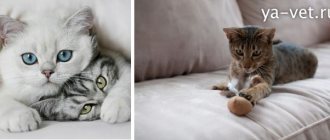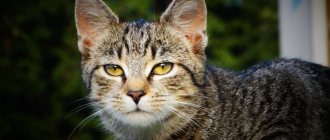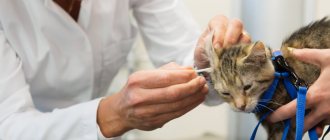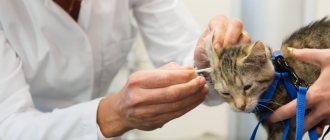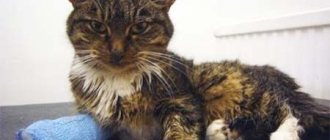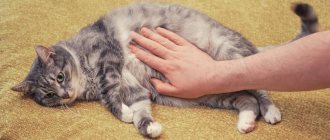Proper functioning of the myocardium ensures the normal functioning of the entire body. With the development of heart failure, a number of pathological changes occur that provoke problems in the cat’s body.
Heart failure is not an independent disease, but only a sign indicating serious dysfunction, leading to the inability of the heart to carry out normal blood circulation.
There are a number of pathologies that provoke problems in the functioning of the myocardium. The owner of a cat should know what can provoke the development of pathology and how to prevent serious changes in the animal’s body.
Features of heart failure in cats
For some reason, a pet’s heart may sometimes not perform all its functions. This leads to a “failure” of the functioning of the entire organism as a whole.
This is interesting! Cats suffer from acute heart failure less frequently than humans. This is facilitated by the peculiarities of nutrition and the specificity of biochemical processes in the animal’s body.
As a rule, in cats and dogs, the development of heart failure is associated with a whole complex of disorders, since the abnormal rhythm of contraction of the heart muscle disrupts blood circulation throughout the body.
Pathology is more common in individuals over 6 years of age. But it happens that symptoms of the disease appear in kittens as early as six months. Therefore, it is a mistake to believe that only old animals suffer from heart failure. Even owners of small puppies and kittens can face this terrible diagnosis, and this is due to a number of reasons.
There are several types of heart failure in cats.
- along the way there is acute and chronic heart failure;
- they also talk about a congenital or acquired illness;
- In addition, heart problems can be primary and secondary (arising after infectious diseases).
It is also worth knowing about the predisposition of some breeds to the development of diseases of the cardiovascular system. Large breeds of cats (for example, Maine Coon and others) are more likely than others to develop diseases of the cardiovascular system.
How is heart disease treated in dogs?
Do not ignore the doctor’s recommendations, strictly follow the treatment regimen and dosage. If you doubt a competent diagnosis, consult another veterinarian. Treatment is often comprehensive and includes not only cardiac medications, but also other medications. First, tablets are prescribed, in severe cases - injections.
Pimobendan
For valve degeneration and dilated cardiomyopathy, drugs are prescribed whose active ingredient is pimobendan:
- Vetmedin (Germany);
- Hartmedin (Czech Republic);
- Pimopet or PimoPet (Latvia).
The medicine is prescribed if the dog has shortness of breath, cough, or ascites (fluid accumulation in the abdominal cavity). Pimobendan has the following properties:
- improves the ability of the myocardium to pump blood;
- dilates peripheral blood vessels, reducing high blood pressure, reducing the load on the heart.
Pimobendan is contraindicated in hypertrophic cardiomyopathy and aortic stenosis. It is not prescribed if the heart pumps blood too much, or with liver failure.
Ramipril
Ramipril is an ACE inhibitor that reduces blood pressure and smooth muscle tone of blood vessels. Thus, the substance allows you to gently reduce peripheral pressure without affecting the heart rate.
Ramipril contains drugs such as Zoocard (Russia) and Vazotop (Austria). They are prescribed for:
- high blood pressure;
- chronic heart failure (CHF);
- cardiomyopathies;
- renal failure.
Medicines are also used to prevent myocardial ischemia and are prescribed to improve exercise endurance. Ramipril helps puppies with heart defects survive.
Zoocard also contains L-carnitine (a relative of vitamin B), bee royal jelly, which restores the tone of blood vessels in the heart and brain. They protect against free radicals, increase resistance to oxygen starvation, and improve energy metabolism in heart cells.
Cardalis
For the treatment of CHF, the doctor may prescribe Cardalis (Hungary). This is a combination drug that lowers blood pressure and prevents vasoconstriction. Thus, it reduces the load on the myocardium and pressure in the left atrium.
The drug should not be used if heart failure is caused by stenosis of the aorta or pulmonary artery. Other contraindications include deficiency of corticosteroid hormones, excess potassium, lack of sodium.
Causes of heart failure
The causes of heart failure in cats can be very diverse, but most often the pathology starts with diseases such as:
- hypertrophic cardiomyopathy (pathological proliferation of the myocardium);
- hyperthyroidism (thyroid problems);
- hypertension (high blood pressure);
- oncology;
- congenital heart defects.
Types of cardiomyopathy
Most often, veterinarians diagnose various types of cardiomyopathy.
Hypertrophic
The most common form of cardiomyopathy.
With this type of heart failure, the heart muscle increases in size several times, and mainly the ventricular myocardium increases. This leads to the fact that the volume of the ventricle of the heart decreases. As a result, there is less blood in it, but the body needs oxygen! Therefore, the myocardium has to contract more often and rests less. But rest is necessary. Hence the “fatigue” of the muscle, which is followed by heart failure in dogs and cats.
Dilated cardiomyopathy
With this type of heart failure in cats and dogs, the wall of the ventricle does not thicken, but stretches. But despite the fact that the volume of the ventricle increases and there is a lot of blood in the heart, the normal function of the heart is still impaired. The myocardium cannot fully contract, thereby expelling all the blood from the ventricle. Some of it “stagnates,” which stretches the walls even more.
Restrictive
In this case, the muscles seem to be “wooden” and practically do not stretch. Their elasticity is lost. And, despite the fact that the volume of the ventricle does not change, the myocardium cannot cope with its functions due to loss of elasticity.
Intermediate
A very complex type of cardiomyopathy. And all because it is not always possible to diagnose it, because changes from different types of cardiomyopathy are mixed.
At-risk groups
People at risk for cardiomyopathy include:
- Cats and dogs over 6 years old. This is all simply explained by the fact that organs “get tired” throughout life and become “targets” for pathogens of infectious diseases. And the heart experiences increased stress.
- Animals of large breeds. The peculiarity is due to the fact that the heart, like a pump, needs to pump a lot of blood under high pressure.
- Representatives of mini breeds. Their miniature hearts have to beat at a much higher frequency, which “wears out” the heart muscle faster.
- Animals that have had infectious diseases, as well as those suffering from high blood pressure or excessive activity of the thyroid gland.
- Cats and dogs after severe treatment (many medications can cause heart complications)
- Having a genetic predisposition (this is why it is so important to know the pedigree of a kitten or puppy).
- Animals suffering from malnutrition!
Prevention
It is impossible to completely eliminate the risk of developing pathology. Significantly reduce the likelihood of its occurrence:
- Proper feeding.
- Absence of factors that cause stress in the cat.
- Examination by a veterinarian every year, if the breed of the animal predisposes to the disease - every 6 months.
- Exclusion from breeding of animals with a history of congenital heart pathologies.
Pet owners need to know that a number of heart pathologies, such as feline hypertrophic cardiomyopathy and some others, may not manifest themselves for a long time. But if the animal’s body is subjected to stress, including anesthesia, cardiac pathology can become threatening to the normal existence and even life of the cat. Therefore, before carrying out planned surgical interventions, it is very important to undergo a cardiac examination (Ultrasound of the heart), during which hidden cardiac pathologies of cats, if any, will be identified.
You can read more about the importance of cardiac examination of animals in the section Heart ultrasound and Cardiology.
In our clinic, cardiology appointments are conducted by doctors Lidiya Mikhailovna Biryukova and Olga Vladimirovna Evstifeeva.
Symptoms of heart failure in cats
Symptoms of heart failure in cats depend on many factors. One of which is the age of the animal.
Kittens
The most common cause of heart failure in kittens is congenital heart disease. As a rule, this pathology may not manifest itself in any way in the first months of life.
The following symptoms should alert you to a kitten:
- loss of appetite;
- severe fatigue;
- lethargy and apathy;
- shortness of breath after any, even minor, physical activity;
- pallor of the mucous membranes (gums and tongue);
- loss of consciousness.
In kittens, after the first symptoms appear, the condition can worsen very quickly, so the animal must be taken to the clinic as quickly as possible.
Adult cats and kittens
Symptoms in an adult animal are largely similar to those described for kittens, but additional manifestations may also appear, such as:
- strong thirst;
- rapid weight gain;
- “heart cough”, which often appears at night;
- wheezing when breathing;
- vomiting (sometimes occurs with severe coughing attacks).
Chronic heart failure in cats
appears gradually. Symptoms do not appear all at once and increase slowly. Therefore, even the most attentive owners may not notice the disease immediately. The limbs and chest area often swell.
Elderly animals
In older animals, the disease is most difficult and the symptoms can no longer be missed.
The first cause for serious concern would be:
- unsteady gait;
- loss of orientation in space;
- frequent fainting;
- almost non-stop “heart cough”.
The disease also makes itself felt by an enlarged abdomen and the characteristic positioning of the front paws.
Signs
Typical symptoms:
- dyspnea;
- difficulty breathing, suffocation;
- wheezing;
- weakness, lethargy;
- weak pulse;
- pale mucous membranes;
- the appearance of pink foam from the mouth.
It is not typical for cats, unlike dogs, to breathe with their mouths open even in the heat or during physical exertion, this is important to remember. Cats are sprinters, they are adapted to high, but very short-term loads, in contrast to dogs, adapted to long-term endurance loads. If a cat breathes with its mouth open even after minor exertion, this is a reason to take it to a cardiologist for a full examination. If this is accompanied by other symptoms - weakness, lethargy, change in color of the mucous membranes (turn pale, blue, purple), it is necessary to urgently take her to the clinic in the intensive care unit.
Diagnostics
For treatment to give positive results, the diagnosis must be carried out by an experienced veterinarian - a cardiologist. To make a diagnosis you need:
- Collecting a complete medical history (data about the pet from the owner). It is important to prepare and provide the veterinarian with detailed, comprehensive information; it is best to bring it to the appointment in writing, so as not to miss important details about the health and vital functions of your pet.
- Listening, palpation and other visual examination methods.
- Pressure measurement. Decreased readings usually indicate serious heart problems.
- ECG.
- Ultrasound of the heart.
- X-ray examination of the chest.
- Blood and urine tests.
Important! If a cat is diagnosed with heart failure, then the animal is prohibited from being used for breeding.
For cats, the very process of bearing and giving birth to offspring can be dangerous, since it involves a significant load on the cardiovascular system. Cats are excluded due to the high likelihood of inheriting a predisposition to heart failure.
Pathogenesis of renal edema
The mechanism of formation of renal edema is associated with the following phenomena in nephrological patients:
- massive loss of protein in urine;
- decrease in plasma albumin concentration;
- hyperlimidemia;
- increased movement of fluid from the intravascular space.
Patients have a high ratio of sodium and potassium in the urine, which indicates an imbalance of water and electrolyte balance.
The mechanism for the appearance of such a symptom is still not fully understood, but the characteristic picture indicates to the doctor pyelonephritis, glomerulonephritis. Filtration and excretion of urine are also impaired with kidney cysts, benign or malignant neoplasms.
How to provide first aid for heart failure
If you do not immediately help your pet during an acute attack of heart failure, he may die suddenly.
You need to act measuredly, but quickly, as follows:
- lay the animal head to one side;
- remove tongue from mouth;
- Apply a cool compress prepared in advance to the cat’s head;
- try to bring the animal to its senses by holding a cotton ball soaked in ammonia to its nose;
- The paws must be held above the head to increase blood flow to it.
Treatment of cats with heart failure
Any treatment of a cat with symptoms of heart failure should be carried out under the strict supervision of a veterinarian! Self-medication can not only aggravate the course of the disease, but also lead to the death of the animal!
Be sure to find out the cause of the malaise!
Important! Ignoring the problem over time can lead to irreversible changes in the heart and blood vessels.
If acute heart failure is determined, treatment for the cat may include:
- maximum rest and minimization of physical activity;
- oxygen therapy (oxygen chamber or blood oxygenation procedure);
- intravenous administration of drugs (cardiac glycosides, steroids, antibiotics, electrolytes, diuretics, potassium supplements, anticoagulants, etc.);
- symptomatic and supportive therapy;
- pumping out fluid accumulating in body cavities (if diuretics are insufficiently effective).
Unfortunately, with such a diagnosis, the animal will require lifelong maintenance therapy. Even after the acute danger subsides, these cats are very important:
- minimizing stress;
- correct activity mode;
- special diet (no salt);
- limited access to water (drinking a large amount of water will provoke swelling);
- Regular visits to the veterinarian and monitoring of the condition.
It is necessary to strictly follow all medical instructions and recommendations. The slightest deviation from the treatment regimen will negate all progress towards restoring heart rhythm. Taking medications for too long can also become dangerous to your health in some cases.
Therapeutic measures
Here everything depends both on the pathology itself and on the animal and its physiological state. The fact is that heart surgery is not performed on cats, since the technique for such surgical interventions has simply not been developed. All currently used treatment is medication. The earlier this disease is detected in your cat, the greater the chance that it will be stopped at the very beginning. As a rule, a special diet with adjusted doses of potassium and magnesium is used, as well as medications that support cardiac activity. If you turned to the veterinarians too late, and by that time the disease had already “bloomed” wildly, everything becomes somewhat more complicated.
Again, the cat has to be put on a strict diet. Then they begin to treat concomitant diseases: ascites, tracheitis (which can be caused by a constant cough), the animal should regularly receive drugs that prevent the development of pulmonary edema (cardiac stimulating drugs). To prevent the development of edema, diuretics are often used. Please note that your pet with heart failure will likely be on medication for life, since the root cause of heart disease is not always possible to eliminate. In any case, the question of how to treat a cat should only be decided by a veterinarian! Trying to “help”, you may well kill your cat, even if not intentionally.



